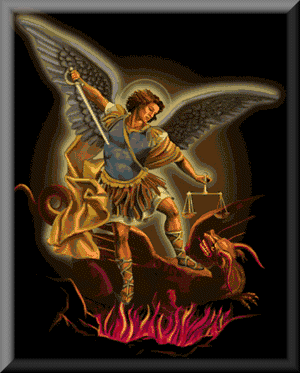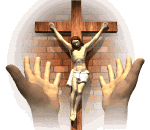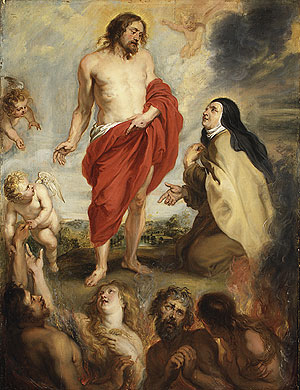Directions:
1. Print out copies of the fish design on plain white paper (even better, use white card or cover stock).
2. Have the children color the fish with markers or crayons. Markers are brighter, but crayon will work. (Note: While they are coloring the fish, explain to them the meaning of the Greek letters on the side of the drawing, and tell the children what Jesus meant when he said to Saint Andew and Saint Peter, "I will make you fishers of men" -- and that all Christians are called to withess, to spread message of salvation through Jesus Christ to others, as the apostles and disciples did.)
3. Wad up the paper towel and dip it in a saucer containing a small amount of oil, and apply the oil all over the colored drawing generously (but not dripping), letting it soak into the paper. Use a dry paper towel to remove excess oil. The oil will make the paper translucent, giving it a stained-glass effect.
4. Cut out the fish and make a small hole about half an inch from the top. Cut the yarn or ribbon about 12" long and thread it through the hole, then tie it to make a hanging loop.
5. Hang the Christian fish in a window so the light can shine through it, where it will be a daily reminder during the season of Advent of our life as Christians permeated by the Light of Christ.
BENEDICT XVI, GENERAL AUDIENCE, Wednesday, 14 June 2006
Andrew, the Protoclete
Dear Brothers and Sisters,
In the last two catecheses we spoke about the figure of St Peter. Now, in the measure that sources allow us, we want to know the other 11 Apostles a bit better. Therefore, today we shall speak of Simon Peter's brother, St Andrew, who was also one of the Twelve.
The first striking characteristic of Andrew is his name: it is not Hebrew, as might have been expected, but Greek, indicative of a certain cultural openness in his family that cannot be ignored. We are in Galilee, where the Greek language and culture are quite present. Andrew comes second in the list of the Twelve, as in Matthew (10: 1-4) and in Luke (6: 13-16); or fourth, as in Mark (3: 13-18) and in the Acts (1: 13-14). In any case, he certainly enjoyed great prestige within the early Christian communities.
The kinship between Peter and Andrew, as well as the joint call that Jesus addressed to them, are explicitly mentioned in the Gospels. We read: "As he walked by the Sea of Galilee, he saw two brothers, Simon who is called Peter and Andrew his brother, casting a net into the sea; for they were fishermen. And he said to them, "Follow me, and I will make you fishers of men'" (Mt 4: 18-19; Mk 1: 16-17).
From the Fourth Gospel we know another important detail: Andrew had previously been a disciple of John the Baptist: and this shows us that he was a man who was searching, who shared in Israel's hope, who wanted to know better the word of the Lord, the presence of the Lord.
He was truly a man of faith and hope; and one day he heard John the Baptist proclaiming Jesus as: "the Lamb of God" (Jn 1: 36); so he was stirred, and with another unnamed disciple followed Jesus, the one whom John had called "the Lamb of God". The Evangelist says that "they saw where he was staying; and they stayed with him that day..." (Jn 1: 37-39).
Thus, Andrew enjoyed precious moments of intimacy with Jesus. The account continues with one important annotation: "One of the two who heard John speak, and followed him, was Andrew, Simon Peter's brother. He first found his brother Simon, and said to him, "We have found the Messiah' (which means Christ). He brought him to Jesus" (Jn 1: 40-43), straightaway showing an unusual apostolic spirit.
Andrew, then, was the first of the Apostles to be called to follow Jesus. Exactly for this reason the liturgy of the Byzantine Church honours him with the nickname: "Protokletos", [protoclete] which means, precisely, "the first called".
And it is certain that it is partly because of the family tie between Peter and Andrew that the Church of Rome and the Church of Constantinople feel one another in a special way to be Sister Churches. To emphasize this relationship, my Predecessor Pope Paul VI, in 1964, returned the important relic of St Andrew, which until then had been kept in the Vatican Basilica, to the Orthodox Metropolitan Bishop of the city of Patras in Greece, where tradition has it that the Apostle was crucified.
The Gospel traditions mention Andrew's name in particular on another three occasions that tell us something more about this man. The first is that of the multiplication of the loaves in Galilee. On that occasion, it was Andrew who pointed out to Jesus the presence of a young boy who had with him five barley loaves and two fish: not much, he remarked, for the multitudes who had gathered in that place (cf. Jn 6: 8-9).
In this case, it is worth highlighting Andrew's realism. He noticed the boy, that is, he had already asked the question: "but what good is that for so many?" (ibid.), and recognized the insufficiency of his minimal resources. Jesus, however, knew how to make them sufficient for the multitude of people who had come to hear him.
The second occasion was at Jerusalem. As he left the city, a disciple drew Jesus' attention to the sight of the massive walls that supported the Temple. The Teacher's response was surprising: he said that of those walls not one stone would be left upon another. Then Andrew, together with Peter, James and John, questioned him: "Tell us, when will this be, and what will be the sign when these things are all to be accomplished?" (Mk 13: 1-4).
In answer to this question Jesus gave an important discourse on the destruction of Jerusalem and on the end of the world, in which he asked his disciples to be wise in interpreting the signs of the times and to be constantly on their guard.
From this event we can deduce that we should not be afraid to ask Jesus questions but at the same time that we must be ready to accept even the surprising and difficult teachings that he offers us.
Lastly, a third initiative of Andrew is recorded in the Gospels: the scene is still Jerusalem, shortly before the Passion. For the Feast of the Passover, John recounts, some Greeks had come to the city, probably proselytes or God-fearing men who had come up to worship the God of Israel at the Passover Feast. Andrew and Philip, the two Apostles with Greek names, served as interpreters and mediators of this small group of Greeks with Jesus.
The Lord's answer to their question - as so often in John's Gospel - appears enigmatic, but precisely in this way proves full of meaning. Jesus said to the two disciples and, through them, to the Greek world: "The hour has come for the Son of man to be glorified. I solemnly assure you, unless a grain of wheat falls to the earth and dies, it remains just a grain of wheat; but if it dies, it produces much fruit" (12: 23-24).
Jesus wants to say: Yes, my meeting with the Greeks will take place, but not as a simple, brief conversation between myself and a few others, motivated above all by curiosity. The hour of my glorification will come with my death, which can be compared with the falling into the earth of a grain of wheat. My death on the Cross will bring forth great fruitfulness: in the Resurrection the "dead grain of wheat" - a symbol of myself crucified - will become the bread of life for the world; it will be a light for the peoples and cultures.
Yes, the encounter with the Greek soul, with the Greek world, will be achieved in that profundity to which the grain of wheat refers, which attracts to itself the forces of heaven and earth and becomes bread.
In other words, Jesus was prophesying about the Church of the Greeks, the Church of the pagans, the Church of the world, as a fruit of his Pasch.
Some very ancient traditions not only see Andrew, who communicated these words to the Greeks, as the interpreter of some Greeks at the meeting with Jesus recalled here, but consider him the Apostle to the Greeks in the years subsequent to Pentecost. They enable us to know that for the rest of his life he was the preacher and interpreter of Jesus for the Greek world.
Peter, his brother, travelled from Jerusalem through Antioch and reached Rome to exercise his universal mission; Andrew, instead, was the Apostle of the Greek world. So it is that in life and in death they appear as true brothers - a brotherhood that is symbolically expressed in the special reciprocal relations of the See of Rome and of Constantinople, which are truly Sister Churches.
A later tradition, as has been mentioned, tells of Andrew's death at Patras, where he too suffered the torture of crucifixion. At that supreme moment, however, like his brother Peter, he asked to be nailed to a cross different from the Cross of Jesus. In his case it was a diagonal or X-shaped cross, which has thus come to be known as "St Andrew's cross".
This is what the Apostle is claimed to have said on that occasion, according to an ancient story (which dates back to the beginning of the sixth century), entitled The Passion of Andrew:
"Hail, O Cross, inaugurated by the Body of Christ and adorned with his limbs as though they were precious pearls. Before the Lord mounted you, you inspired an earthly fear. Now, instead, endowed with heavenly love, you are accepted as a gift.
"Believers know of the great joy that you possess, and of the multitude of gifts you have prepared. I come to you, therefore, confident and joyful, so that you too may receive me exultant as a disciple of the One who was hung upon you.... O blessed Cross, clothed in the majesty and beauty of the Lord's limbs!... Take me, carry me far from men, and restore me to my Teacher, so that, through you, the one who redeemed me by you, may receive me. Hail, O Cross; yes, hail indeed!".
Here, as can be seen, is a very profound Christian spirituality. It does not view the Cross as an instrument of torture but rather as the incomparable means for perfect configuration to the Redeemer, to the grain of wheat that fell into the earth.
Here we have a very important lesson to learn: our own crosses acquire value if we consider them and accept them as a part of the Cross of Christ, if a reflection of his light illuminates them.
It is by that Cross alone that our sufferings too are ennobled and acquire their true meaning.
The Apostle Andrew, therefore, teaches us to follow Jesus with promptness (cf. Mt 4: 20; Mk 1: 18), to speak enthusiastically about him to those we meet, and especially, to cultivate a relationship of true familiarity with him, acutely aware that in him alone can we find the ultimate meaning of our life and death.
© Copyright 2006 - Libreria Editrice Vaticana
 The following is the longer version of the vital prayer composed by Pope Leo XIII in 1888 after his startling vision as to the future of the Church. This prayer was dedicated for the Feast of St. Michael 1448 years from the date of the election of the first Leo - Pope Saint Leo the Great. Everyone is familiar with the first prayer below which was mandated by His Holiness as part of the Leonine Prayers after Low Mass. Below are both the short and longer versions of this poignant prayer which should never be forgotten.
The following is the longer version of the vital prayer composed by Pope Leo XIII in 1888 after his startling vision as to the future of the Church. This prayer was dedicated for the Feast of St. Michael 1448 years from the date of the election of the first Leo - Pope Saint Leo the Great. Everyone is familiar with the first prayer below which was mandated by His Holiness as part of the Leonine Prayers after Low Mass. Below are both the short and longer versions of this poignant prayer which should never be forgotten. 
 Look down upon me, O good and gentle Jesus, while before Thy face I humbly kneel, and with burning soul pray and beseech Thee to fix deep in my heart lively sentiments of faith, hope and charity, true contrition for my sins, and a firm purpose of amendment; the while I contemplate with great love and tender pity Thy five most precious wounds, pondering over them within me, calling to mind the words which David Thy prophet said of Thee, my good Jesus: "They have pierced My hands and My feet; they have numbered all My bones."
Look down upon me, O good and gentle Jesus, while before Thy face I humbly kneel, and with burning soul pray and beseech Thee to fix deep in my heart lively sentiments of faith, hope and charity, true contrition for my sins, and a firm purpose of amendment; the while I contemplate with great love and tender pity Thy five most precious wounds, pondering over them within me, calling to mind the words which David Thy prophet said of Thee, my good Jesus: "They have pierced My hands and My feet; they have numbered all My bones." 









